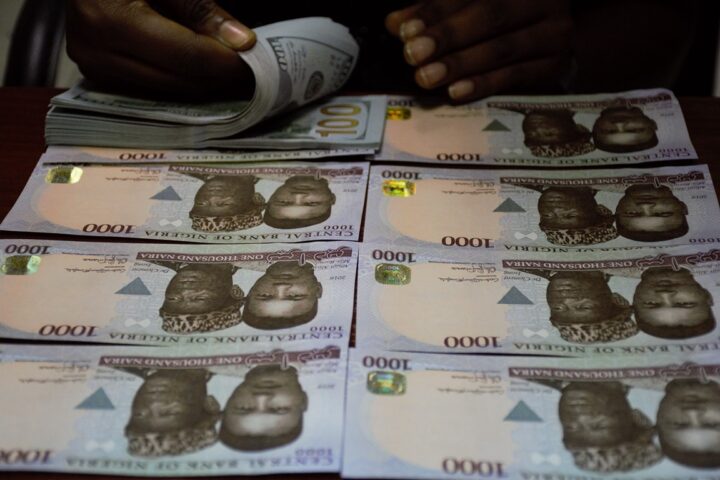Efforts by the Central Bank of Nigeria to stabilize the naira appear to be manifesting positive outcomes, as evidenced by the decreased naira volatility observed in the foreign exchange market.
As a result, Nigeria’s external reserves have witnessed accretion after the Monetary Policy Committee meeting in February.
As of March 14, 2024, external reserves grew by about $210 million, rising to $34.42 billion.
A report by Cordros Capital noted, “Nigeria’s FX reserves increased by USD209.89 million w/w to close at USD34.42 billion (14 March). Also, the naira appreciated by 1.5% to NGN1,602.75/USD at the Nigerian Autonomous Foreign Exchange Market (NAFEM), with total turnover (as of 14 March 2024) decreasing by 41.6% WTD to USD743.54 million, as trades were consummated within the NGN1,425.35 – NGN1,650.00/USD range.”
In the Forwards market, the naira rate for the 1-month (-0.1% to NGN1,601.14/USD) contract increased, but declined on the 3-month (+1.4% to NGN1,641.08/USD), 6-month (+1.7% to NGN1,694.97/USD), and 1-year (+1.3% to NGN1,817.32/USD) contracts.
Although the apex bank has yet to fully clear the FX backlogs due to persistently low forex supply, “we hold the view that the volatility of the naira will remain subdued in the short term. This expectation is underpinned by reduced currency speculation supported by the CBN’s ongoing monetary tightening measures and improved liquidity resulting from the uptick in forex inflows from FPIs,” analysts said.
Cordros capital noted that the CBN’s initiatives aimed at stabilising the naira, encompasses addressing FX backlogs, increasing domestic interest rates to make naira-denominated assets attractive, and supplying dollars to BDCs.
The International Monetary Fund, one of Bretton Woods institutions, said recently that the decision of the Monetary Policy Committee of the Central Bank of Nigeria to hike the benchmark rate by 400 basis points will help contain inflation and pressure on the naira, and that it is a step in the right direction.
It also stated that President Bola Tinubu inherited a difficult economic situation from his predecessor which has necessitated the myriad of challenges bedeviling the Nigerian economy.
Similarly, Fitch Ratings said the recent 400 basis points increase, to 22.75 per cent, in Nigeria’s Monetary Policy Rate marked progress in the country’s effort to contain inflation.
“As of March 14, 2024, external reserves grew by about $210 million, rising to $34.42 billion.”
The Monetary Policy Committee of the CBN increased the policy rate by 400 basis points to 22.75 per cent for a total tightening of 1,025 basis points from May 2022.
The MPC held its first meeting for the year on the 26th and 27th of February 2024 to decide on the appropriate course of monetary policy going forward. All twelve (12) members of the Committee decided to further tighten monetary policy as follows: Raise the MPR by 400 basis points to 22.75 from 18.75 per cent. Adjust the asymmetric corridor around the MPR to +100/-700 from +100/-300 basis points. Raise the Cash Reserve Ratio from 32.5 per cent to 45.0 per cent and retain the Liquidity Ratio at 30 per cent.
In a related development, the overnight rate in the money market remained elevated in the review week, following the liquidity dearth at the start of the week.
The OVN rate trended to a five-year high of 33.0 percent as of Wednesday (March 13), before softening to 31.1 percent (+7bps w/w) owing to inflows of N771.11 billion from the maturing MAR-2024 bond with accompanying coupon payments.
Consequently, the average system liquidity closed higher last week at a net long position of N2.50 trillion (vs a net long position of NGN1.37 trillion in the previous week).
That being said, analysts noted that the level was supported by DMBs’ elevated borrowing from the CBN’s SLF window (average for the week: N2.07 trillion).
The Treasury bills secondary market was slightly bullish last week, as the average yield across the market dipped by 14bps to 18.7 percent. Financial market experts attributed the week’s performance to market players moving to the secondary market to cover for lost bids at the NTB auction, and cherry-picking instruments with attractive yields.
Across the market segments, the average yield declined by 18bps to 18.6 percent in the NTB segment and contracted by 4bps to 18.8 percent in the OMO secondary market. At the NTB primary auction, the CBN offered participants instruments worth N161.49 billion – N0.73 billion for the 91-day, N0.92 billion for the 182-day, and N159.85 billion for the 364-day bills.
The auction was massively contested as the total subscription settled at N1.50 trillion (bid-to-offer: 9.3 xs). Eventually, the CBN allotted exactly what was offered – at respective stop rates of 16.24 percent (previously: 17.24%), 17.00 percent (previously: 18.00%), and 21.12 percent (previously: 21.49%).



